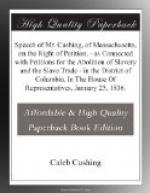At that crisis, in the very greenness of the immature youth of the Constitution, when it was least able to bear the shock of sectional collision, Mr. Madison, Southerner as he was, steadily opposed his friends from the South and successfully advocated the commitment of the petitions. I submit to the House his speech, as I find it very briefly reported in the newspapers of that day.
“Mr. Madison observed, that it was his opinion yesterday that the best way to proceed in this business was to commit the memorial without any debate on the subject. From what has taken place, he was more convinced of the propriety of the idea. But, as the business has engaged the attention of many members, he would offer a few observations for the consideration of the House. He then entered into a critical review of the circumstances respecting the adoption of the constitution, the ideas upon the limitation of the power of Congress to interfere in the regulation of the commerce in slaves, and showing that they undoubted were not precluded from interposing in their importation, and generally to regulate the mode in which every species of business shall be transacted. He adverted to the Western country, and the cession of Georgia, in which Congress have certainly the power to regulate the subject of slavery, which shows that gentlemen are mistaken in supposing that Congress cannot constitutionally interfere in the business in any degree whatever. He was in favor of committing the petitions, and justified the measure by repeated precedents in the proceedings of the House.”




